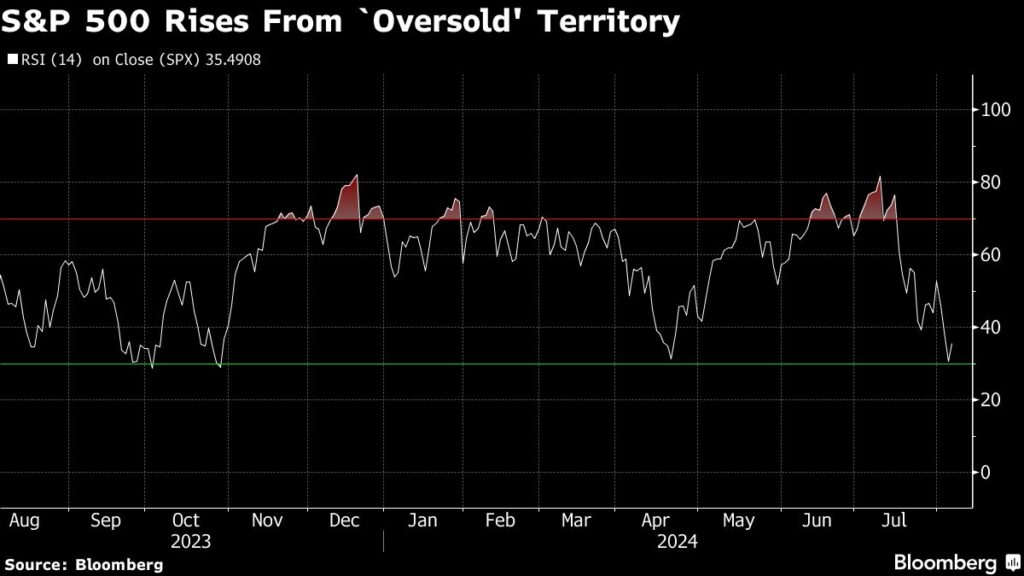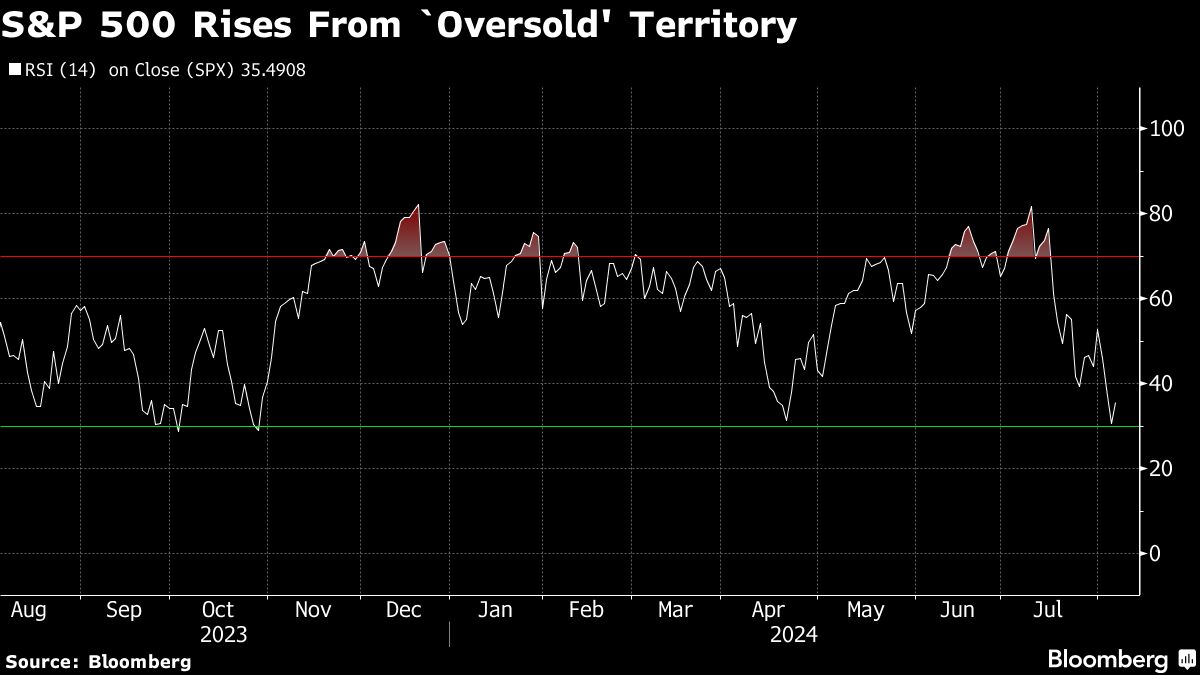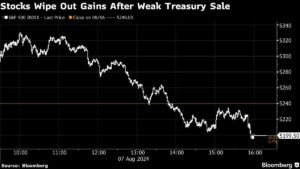Stocks Lose Steam on Weak $42 Billion US Bond Sale: Markets Wrap


(Bloomberg) — A swoon in US stocks after a weak $42 billion sale of Treasuries underscored the fragility of the market rebound in the wake of historic volatility.
Most Read from Bloomberg
Following a surge of almost 2% driven by the Bank of Japan’s dovish signals, the S&P 500 wiped out its gains. Investors shunned the Treasury 10-year auction — despite a pre-sale selloff — as weaker-than-expected demand offered a signal that the recent rally in bonds may have run its course.
“Terrible 10-year auction,” said Peter Boockvar at The Boock Report. “One would have thought that the 10-year note auction today would do just fine with that backdrop but no, the auction was terrible.”
Bonds also came under pressure as 17 high-grade issuers rushed to sell debt in the busiest day since February. Meta Platforms Inc. kicked off the deal deluge, with a $10.5 billion offer.
At Nationwide, Mark Hackett says the latest events have been a “masterclass” in how emotions can dominate the movement in markets, particularly when sentiment and positioning are nearly universally positive.
The S&P 500 hovered near 5,240. Micron Technology Inc. is resuming a buyback program. Super Micro Computer Inc. tumbled on disappointing earnings. Airbnb Inc. sank on a weak outlook.
Treasury 10-year yields rose six basis points to 3.95%. The Japanese yen fell 2%. Mexico’s peso led a rally in emerging markets, easing pressure on currencies that had been hammered as investors abandoned yen-funded bets on riskier assets.
Japan’s reassurance came on the heels of massive swings in the country’s stock prices over the past week, as benchmark indexes plunged into bear markets before rebounding sharply. The moves were compounded by the view the Federal Reserve would cut rates more aggressively, prompting traders to rapidly unwind once-popular yen-funded carry trades — including crowded positions in US tech stocks.
“Investors are making a more sober assessment of the events over the past week or so,” said Fawad Razaqzada at City Index and Forex.com. “That’s not to say we are completely out of the woods just yet. But there’s at least some stabilization, which should allow some markets to re-align with fundamentals.”
“The Bank of Japan has stepped forward first to try to calm markets,” said Krishna Guha at Evercore. “It follows extreme swings in Japanese asset prices and the unwind of global yen carry trades that has supercharged the AI reversal and selloff in stocks associated with fresh fears of a US recession.”
The global unwinding of the carry trade triggered by the BOJ surprisingly more hawkish stance last week – that in turn strengthened the yen markedly – has eased considerably, according to Quincy Krosby at LPL Financial.
“Markets globally have felt a sigh of relief as the velocity of the unwinding eases, but the yen’s relationship to the dollar is also a key component of the carry trade calculus,” she noted. “A softer dollar, driven by the markets perception that the Fed will soon initiate an easing cycle, should help support a stronger yen — a negative for the trade.”
Markets have been in a tailspin due to recent weak US data, but it’s still too soon to suggest the economy is heading for a downturn, according to Franklin Templeton Institute. After a surge in Treasuries, “it makes sense” to take some profit, Stephen Dover wrote.
US Treasury yields are probably too low in the absence of “broad-based evidence that an acute deterioration is underway in either the labor market or in market function,” according to strategists at Goldman Sachs Group Inc.
“The case for a meaningful rally from here is that one (or both) of those risks materialize,” William Marshall and Bill Zu wrote. “Under more benign outcomes, we think the center of gravity for yields is likely to be above current levels across the curve, in relative parallel versus the forwards.”
To Will Compernolle at FHN Financial, Treasury yields are now comfortably higher than their Monday lows, projecting a sense of calm after financial markets went haywire at the beginning of this week.
“It’s too early to declare the chaos over, however, and Treasury yields could veer back lower during light August trading and a relative data vacuum the rest of this week,” he said.
Corporate Highlights:
-
Walt Disney Co. gave a mixed picture as it reported third-quarter results on Wednesday, with weakness at its famed theme parks offsetting its first-ever profit in streaming.
-
Shopify Inc. reported second-quarter sales and profit that beat analysts’ estimates, showing that the Canadian e-commerce company is managing to navigate cautious consumer spending.
-
CVS Health Corp. lowered its 2024 earnings outlook for the third straight quarter and announced cost-cutting measures to save $2 billion over several years as health-care expenses continue to soar.
-
Ride-hailing company Lyft Inc. posted second-quarter bookings and issued an outlook that fell short of Wall Street’s expectations.
-
Boeing Co. is redesigning the fuselage component that blew out of a nearly new 737 Max 9 aircraft mid-flight in January, as the planemaker seeks to draw lessons from the accident that has thrown it into crisis.
-
Novo Nordisk A/S reported disappointing sales of its blockbuster weight-loss treatment Wegovy, a rare setback for the Danish drugmaker as it braces for more competition in the booming market.
-
Rivian Automotive Inc. is sticking with a full-year vehicle production target unchanged from last year, but its chief executive officer expects output to grow in 2025 even with a plant shutdown looming.
-
Brookfield Asset Management Ltd. said its assets under management rose to a record of approximately $1 trillion, and it reported profit that increased from a year ago but still missed analysts’ expectations.
Key events this week:
-
Germany industrial production, Thursday
-
US initial jobless claims, Thursday
-
Fed’s Thomas Barkin speaks, Thursday
-
China PPI, CPI, Friday
Some of the main moves in markets:
Stocks
-
The S&P 500 fell 0.5% as of 2:14 p.m. New York time
-
The Nasdaq 100 fell 0.8%
-
The Dow Jones Industrial Average fell 0.5%
-
The MSCI World Index was little changed
Currencies
-
The Bloomberg Dollar Spot Index rose 0.1%
-
The euro was little changed at $1.0921
-
The British pound was little changed at $1.2692
-
The Japanese yen fell 1.7% to 146.80 per dollar
Cryptocurrencies
-
Bitcoin fell 2.3% to $55,249.3
-
Ether fell 4.9% to $2,367.35
Bonds
-
The yield on 10-year Treasuries advanced four basis points to 3.94%
-
Germany’s 10-year yield advanced seven basis points to 2.27%
-
Britain’s 10-year yield advanced three basis points to 3.95%
Commodities
This story was produced with the assistance of Bloomberg Automation.
–With assistance from Robert Brand, Sujata Rao and Winnie Hsu.
Most Read from Bloomberg Businessweek
©2024 Bloomberg L.P.





